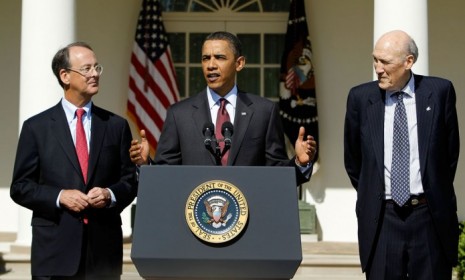Did Obama's debt panel waste its time?
The Simpson-Bowles deficit-reduction commission has issued its final plan, but is it so controversial it will simply be ignored?

A free daily email with the biggest news stories of the day – and the best features from TheWeek.com
You are now subscribed
Your newsletter sign-up was successful
The chairmen of President Obama's bipartisan deficit-reduction panel, former Sen. Alan Simpson (R-WY) and Clinton budget official Erskine Bowles, released their final report on Wednesday, urging big cuts in military spending and Social Security along with the elimination of popular tax deductions. But the proposals won't go to Congress without the approval of at least 14 of the panel's 18 members, and so far only two, Sens. Judd Gregg (R-NH) and Kent Conrad (D-ND), have said they'll vote yes on Friday. After months of effort, has the commission's work been for naught? (Watch Neil Cavuto say the panel should be commended)
The tax changes are deal-killers: Simpson and Bowles have at least achieved "the fruits of true bipartisanship," says Ed Morrissey in Hot Air — both parties hate the proposals. Personally, I don't see anything "outrageous or surprising," and some ideas, like raising the retirement age, "should have been done years ago." But "the elimination of two major tax breaks," especially the home-mortgage deduction, "will almost certainly doom this proposal."
"Deficit panel releases final proposal"
The Week
Escape your echo chamber. Get the facts behind the news, plus analysis from multiple perspectives.

Sign up for The Week's Free Newsletters
From our morning news briefing to a weekly Good News Newsletter, get the best of The Week delivered directly to your inbox.
From our morning news briefing to a weekly Good News Newsletter, get the best of The Week delivered directly to your inbox.
Congress was bound to mess it up: Even if the panel accepts the plan, says Alex Pareene in Salon, it's hard to see "sensible" reforms such as "the elimination of the mortgage-interest deduction making it through Congress without suddenly becoming the expansion of the mortgage-interest deduction." This commission has just been an exercise by "Washington graybeards" meant to demonstrate their "seriousness."
"The power of civility to save the debt panel report"
Simpson-Bowles has already succeeded: The proposals may not be approved, but "make no mistake," Simpson and Bowles have achieved "something historic," says David Broder in The Washington Post. As Bowles proclaimed, "the era of deficit denial in Washington is over." The panel also managed to changed the debate in D.C., making reform of the tax system a priority.
"From the debt commission proposal, a bipartisan path forward"
A free daily email with the biggest news stories of the day – and the best features from TheWeek.com
-
 Film reviews: ‘Send Help’ and ‘Private Life’
Film reviews: ‘Send Help’ and ‘Private Life’Feature An office doormat is stranded alone with her awful boss and a frazzled therapist turns amateur murder investigator
-
 Movies to watch in February
Movies to watch in Februarythe week recommends Time travelers, multiverse hoppers and an Iraqi parable highlight this month’s offerings during the depths of winter
-
 ICE’s facial scanning is the tip of the surveillance iceberg
ICE’s facial scanning is the tip of the surveillance icebergIN THE SPOTLIGHT Federal troops are increasingly turning to high-tech tracking tools that push the boundaries of personal privacy
-
 The billionaires’ wealth tax: a catastrophe for California?
The billionaires’ wealth tax: a catastrophe for California?Talking Point Peter Thiel and Larry Page preparing to change state residency
-
 Bari Weiss’ ‘60 Minutes’ scandal is about more than one report
Bari Weiss’ ‘60 Minutes’ scandal is about more than one reportIN THE SPOTLIGHT By blocking an approved segment on a controversial prison holding US deportees in El Salvador, the editor-in-chief of CBS News has become the main story
-
 Has Zohran Mamdani shown the Democrats how to win again?
Has Zohran Mamdani shown the Democrats how to win again?Today’s Big Question New York City mayoral election touted as victory for left-wing populists but moderate centrist wins elsewhere present more complex path for Democratic Party
-
 Millions turn out for anti-Trump ‘No Kings’ rallies
Millions turn out for anti-Trump ‘No Kings’ ralliesSpeed Read An estimated 7 million people participated, 2 million more than at the first ‘No Kings’ protest in June
-
 Ghislaine Maxwell: angling for a Trump pardon
Ghislaine Maxwell: angling for a Trump pardonTalking Point Convicted sex trafficker's testimony could shed new light on president's links to Jeffrey Epstein
-
 The last words and final moments of 40 presidents
The last words and final moments of 40 presidentsThe Explainer Some are eloquent quotes worthy of the holders of the highest office in the nation, and others... aren't
-
 The JFK files: the truth at last?
The JFK files: the truth at last?In The Spotlight More than 64,000 previously classified documents relating the 1963 assassination of John F. Kennedy have been released by the Trump administration
-
 'Seriously, not literally': how should the world take Donald Trump?
'Seriously, not literally': how should the world take Donald Trump?Today's big question White House rhetoric and reality look likely to become increasingly blurred